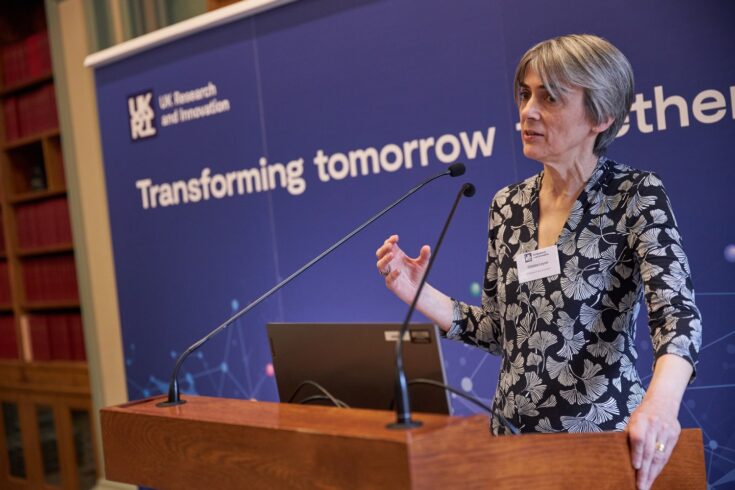As I step down after five eventful years as CEO of UK Research and Innovation (UKRI), I have been reflecting on what we have achieved together. I am deeply grateful for the tireless efforts of our amazing staff, through a time of constant change. And I am excited about the future for UKRI and for research and innovation in the UK, at a time where the many challenges we face are also opportunities.
Research and innovation are fundamentally endeavours of hope and empowerment. In a world where so many are feeling hopeless and disempowered, research and innovation can bring people together to find solutions and build communities, giving everyone the opportunity to contribute and to benefit. This is the North Star that has guided my time at UKRI, and with rising geopolitical tensions it seems more urgent than ever.
I recently came across my application letter for the chief executive post at UKRI, and I was reassured to see that I have done what I said I would do.
In particular, from day one I have talked about the need to consider the whole research and innovation system. The kinds of intervention needed to reap the benefits of the UK’s research and innovation prowess require collective leadership across multiple domains, coordinated actions, and an outcomes-focused approach to monitoring and evaluation that tracks multiple features of the system to allow iterative tuning.
Systems approaches
This approach is not intuitive for many. It is natural to want to focus on specific time-limited objectives. Systems approaches can look uncontrolled, underpowered and unactionable, but in fact the opposite is true.
A good illustration is UKRI’s work within the first pillar of our strategy, People and Careers. Research and innovation success is dependent on skilled and talented people. Solutions to skills shortages typically focus on training programmes monitored in the short term by counting how many people have completed training, and in the longer term by whether employers are reporting recruitment problems.
For talent, the focus is usually on attracting and retaining talented people, for example by addressing concerns about contract precarity for early career researchers, the visa regime, and the availability of high-quality studentships and fellowships. These actions are monitored by counting the numbers of applications for studentships and fellowships, and whether we are attracting people from around the world and rising up the league tables in field weighted publication citations.
This is all good, but in isolation fails to capture the opportunities and transformative potential of more systems-level interventions. In addition to thinking about individual people and particular skills, we crucially need to think about connectivity and the movement of people through and across the system.
So alongside conventional actions to boost skills, and attract, develop and retain a wide range of talented people, we are catalysing much greater career path diversity across the whole research and innovation system. This enables fulfilling careers for a much wider range of people, while at the same time improving research culture, reducing precarity, supporting the rapid adoption and diffusion of new knowledge and skills, stimulating commercialisation, and deeply connecting research and innovation to societal needs.
Connected diversity
UKRI’s interventions to drive this change include the roll out of the Résumé for Research and Innovation, our actions to deliver the Technician Commitment, and mobility support across our short and long-term fellowships. Measures to assess success will include greater diversity in from where and to where our students, fellows, and those employed on our research grants come and go, and responses in the public attitudes to science survey on the role of research and innovation in improving lives and livelihoods for everyone.
UKRI, as nine councils spanning all disciplines and all sectors, holds a unique position in the system and can align investment and incentives to create the connected diversity we need for success. I am inspired by colleagues across UKRI who have embraced this opportunity and established a Systems Thinking Staff Network.
If this kind of systems approach has a weakness, it is in the communications challenge in articulating what UKRI is and does. But as we build momentum behind a shared endeavour to ensure the UK’s research and innovation system thrives, there are more and more examples of our success, where our many stakeholders can see their contributions and reap the benefit of the outcomes.
Fully joined up research and innovation system
It is perhaps not surprising that the things we have delivered about which I am most proud are the ones that are connecting up the research and innovation system across its multiple axes. Shining examples include the Creative Clusters, Future Leaders Fellowships, our strategic themes such as Building a Green Future or Building a Secure and Resilient World, Investor Partnerships for startup companies, place-based Impact Acceleration Accounts, Policy Fellowships, our Cross Research Council Response Mode scheme, and community-led research projects. The power of UKRI is in our ability to curate this kind of portfolio of investments to deliver a fully joined up research and innovation system.
I am confident that the momentum created since the start of UKRI will allow it to reach its full potential, supporting the collaborative systems change needed for a thriving research and innovation endeavour, improving lives and livelihoods across the UK and beyond. I look forward to watching it go from strength to strength under Sir Ian’s leadership.




